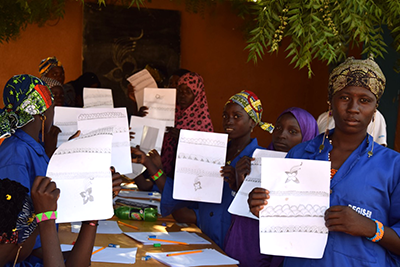
NCBA CLUSA’s USAID-funded Resilience and Economic Growth in Sahel-Enhanced Resilience (REGIS-ER) project in Burkina Faso and Niger is building the capacities of communities and local institutions to absorb, adapt and transform in the face of shocks and stresses.
In addition to the insecurity typically found in the Sahel region—food shortages, extreme poverty and climate shocks—there are also increasing incidents of violent extremism that erodes community cohesion, disrupts markets and transportation, and contributes to an underlying current of fear and instability.
As communities in REGIS-ER regions strive to improve their health and livelihoods amid these challenges, the project’s emphasis on inclusion—particularly of women and youth—is proving effective. During a recent two-day training, Program Manager Linda-Ann Akanvou brought REGIS-ER staff up-to-date on the Positive Youth Development framework.
This approach and philosophy to youth development has been adopted by USAID and guides how projects can engage “youth along with their families, communities and/or governments so that [they] are empowered to reach their full potential.”
Akanvou’s interactive training introduced the basic concepts of Positive Youth Development to a very attentive and engaged audience who quickly became passionate about the subject. “This [Positive Youth Development] training is necessary for all projects given the current Sahelian context,” one training participant said.
The team discussed the Positive Youth Development framework, existing tools, and how it is applicable to the Nigerien and Burkinabé context. Group exercises helped staff understand why youth react a certain way, demonstrated how to engage youth effectively, and explored biases.
One of the most revealing exercises was a roleplay to illustrate the challenges project staff will face in areas where extremist groups are actively recruiting youth. One side of the room was tasked with attracting young people to a project. The other side was tasked with convincing young people to join the extremist group. After a lively recruitment campaign from both sides, participants realized that many of the value propositions for joining an extremist group overlap with development objectives—both provide a sense of belonging, financial returns and security. This challenge motivated staff to be more creative and intentional in providing exciting, quality youth programming.
Applying a Positive Youth Development Approach empowers young people to be the decision-makers and innovators in their own personal development and that of their community. Project staff realized that they needed to be intentional about offering youth-led activities and opportunities for young people to elevate their voices in the community.
—The Resilience and Economic Growth in Sahel-Enhanced Resilience (REGIS-ER) project is part of NCBA CLUSA’s approach to building strong, resilient communities.


